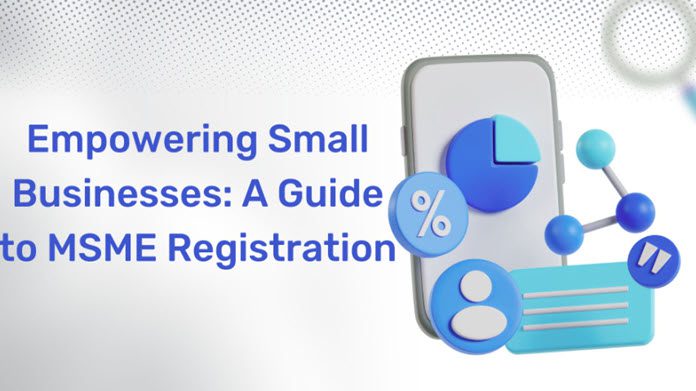Small businesses play a crucial role in driving economic growth and fostering entrepreneurship in any thriving economy. They are the backbone of many nations, contributing to employment generation, innovation, and local development. Recognizing the significance of small businesses, governments around the world have initiated various measures to support and empower them.
One such vital initiative is the registration of Micro, Small, and Medium Enterprises (MSMEs). This article aims to provide a comprehensive guide to MSME registration, highlighting its benefits, eligibility criteria, and the step-by-step process involved.
Understanding MSMEs:
Micro, Small, and Medium Enterprises (MSMEs) are defined as per the criteria set by the respective country’s government or regulatory authority. These definitions may vary from one jurisdiction to another, but the underlying principle remains consistent. Generally, MSMEs are characterized by their relatively smaller investment in plant and machinery, lower workforce size, and their pivotal role in fostering entrepreneurship and socio-economic development.
Benefits of MSME Registration:
MSME registration offers numerous benefits that empower small businesses to thrive and grow. Some key advantages include:
- a) Access to Government Schemes and Incentives: Registered MSMEs gain access to various government schemes, subsidies, and incentives aimed at fostering their growth. These may include financial assistance, tax benefits, priority sector lending, marketing support, and technology upgradation programs.
- b) Credit Facilitation: MSME registration enhances the credibility of small businesses, making it easier for them to obtain loans and credit facilities from banks and financial institutions. It opens up avenues for funding and working capital, enabling expansion and diversification.
- c) Protection of Intellectual Property: MSME registration provides legal protection for intellectual property assets such as trademarks, copyrights, and patents. This safeguards the unique ideas and innovations of small businesses, fostering a conducive environment for creativity and growth.
- d) Enhanced Market Opportunities: Registered MSMEs often receive preferential treatment in government procurement processes, giving them increased opportunities to secure contracts and partnerships. Additionally, they can participate in trade fairs, exhibitions, and networking events to showcase their products or services to a wider audience.
- e) Access to Skill Development Programs: Governments frequently organize skill development and capacity-building programs for MSMEs. By registering, small businesses can benefit from these training initiatives, improving their competitiveness and productivity.
Eligibility Criteria for MSME Registration:
The eligibility criteria for MSME registration typically revolve around factors such as investment in plant and machinery, turnover, and employment size. These criteria may vary across jurisdictions, so it is essential to refer to the specific guidelines provided by the relevant government authority. Generally, micro, small, and medium enterprises are classified based on the following parameters:
- a) Micro Enterprises: Businesses with investment and turnover below a specified threshold, often employing a limited number of individuals.
- b) Small Enterprises: Enterprises with higher investment and turnover limits than micro enterprises, employing a larger workforce.
- c) Medium Enterprises: Businesses falling within a higher investment and turnover range, often having a relatively larger employee count.
Step-by-Step Process of MSME Registration:
The process of MSME registration typically involves the following steps:
- a) Gathering Required Documents: Small businesses must compile necessary documents such as proof of address, identity, ownership, and relevant certificates. These may vary depending on the jurisdiction and the type of enterprise.
- b) Online Registration: Many countries provide online registration portals for MSMEs. Entrepreneurs can visit these portals, create an account, and fill in the required information accurately.
- c) Filling the Application Form: The application form seeks essential details such as business name, address, type of enterprise, investment, turnover, and employment details. It is crucial to provide accurate information to avoid any discrepancies or delays in the registration process.
- d) Uploading Documents: Once the form is filled, the applicant must upload the required documents in the prescribed format. These documents are typically verified for authenticity and compliance.
- e) Submission and Payment: After completing the form and uploading documents, the applicant can submit the application online. Depending on the jurisdiction, a nominal fee may be required to be paid at this stage.
- f) Acknowledgment and Registration Certificate: Upon successful submission, the applicant receives an acknowledgment or reference number. Subsequently, the government authority reviews the application, and upon approval, issues the MSME registration certificate.
Suggested Read: Download MSME Certificate
Conclusion:
MSME registration is a vital step for empowering small businesses and driving economic growth. By registering as an MSME, entrepreneurs can unlock a multitude of benefits, including access to government schemes and incentives, credit facilitation, protection of intellectual property, enhanced market opportunities, and access to skill development programs. These advantages provide a strong foundation for small businesses to thrive, expand, and contribute to the socio-economic development of their communities.
Understanding the eligibility criteria and following the step-by-step process of MSME registration is essential for entrepreneurs looking to leverage these benefits. By providing accurate information and necessary documentation, small businesses can ensure a smooth registration process and obtain the official MSME registration certificate.
It is crucial for governments and regulatory authorities to continue promoting and simplifying the MSME registration process. Ensuring that it remains accessible to all small businesses. By creating a supportive ecosystem for MSMEs, governments can foster entrepreneurship, create employment opportunities. And drive innovation, ultimately leading to overall economic prosperity.
Empowering small businesses through MSME registration is not only beneficial for the individual enterprises but also for the entire economy. As small businesses thrive, they contribute to job creation, innovation. Local development, leading to a more resilient and inclusive economic landscape.
By recognizing the importance of small businesses and providing them with the necessary support. Governments can build a robust foundation for sustainable economic growth. MSME registration serves as a catalyst in this process, empowering small businesses to realize their full potential. And contribute significantly to the overall prosperity of the nation.
